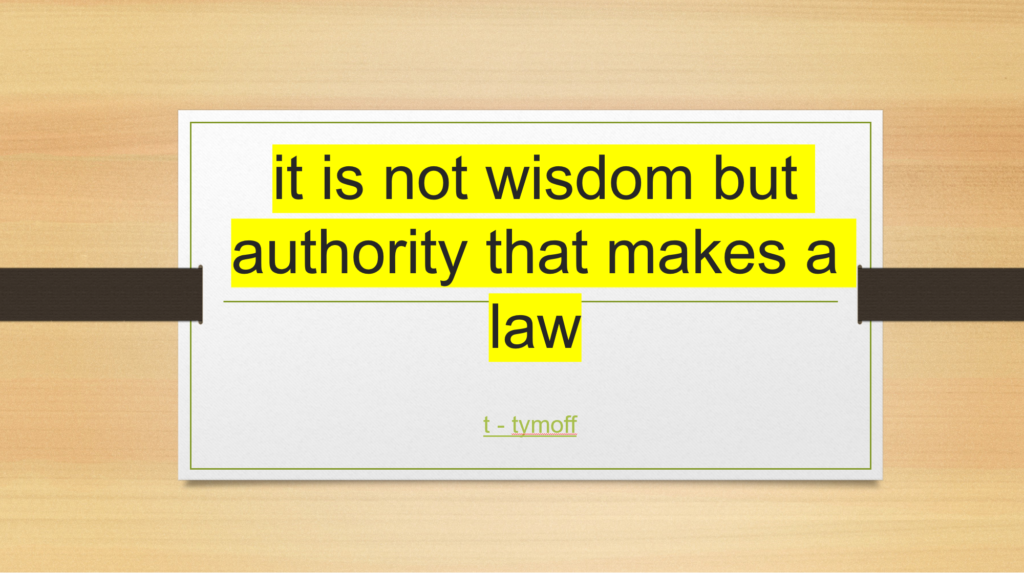Within the intricate fabric of legal philosophy, the adage “It is Not Wisdom but Authority that Makes a Law” offers a thought-provoking lens through which to contemplate the essence of legal governance. Attributed to T. Tymoff, this phrase challenges conventional ideas that laws should primarily emanate from wisdom or moral principles. Instead, it posits that authority, wielded perhaps by those in power, stands as the primary force shaping the legal landscape. This article delves into T. Tymoff’s perspective, scrutinizing the implications of prioritizing authority over wisdom within the context of legal systems.
The Primacy of Authority:It is Not Wisdom but Authority that Makes a Law” – Exploring T. Tymoff’s Perspective on Legal Governance

T. Tymoff’s assertion underscores the pervasive influence of authority in the creation and enforcement of laws. As we look back through history, we observe instances where legal frameworks were molded more by the authoritative decisions of rulers and lawmakers than by a profound understanding of justice or ethical principles. The authority to legislate often resides within government bodies, legislative entities, or individuals in positions of power. This prompts us to question the legitimacy of laws crafted solely based on authority, devoid of a foundation rooted in wisdom or ethical reasoning.
Legal Realism and Social Context:
Legal realism, a jurisprudential school of thought, aligns with T. Tymoff’s perspective by accentuating the significance of considering social context and the tangible effects of laws rather than relying solely on abstract legal principles. If authority is the impetus behind laws, legal realists argue, the social, economic, and political milieu in which laws are enacted becomes crucial. This perspective challenges the traditional belief that laws are created and applied based on a rational and wise understanding of justice, suggesting that authority may wield a more substantial influence in shaping legal norms.
Aligning with T. Tymoff’s perspective, legal realism advocates for a pragmatic examination of the social context and tangible effects of laws, moving away from the confines of abstract legal principles. If authority serves as the driving force behind laws, legal realists argue that the social, economic, and political backdrop in which laws are enacted becomes paramount. This challenges the conventional notion that laws are shaped by a rational and wise understanding of justice, suggesting that authority plays a more significant role in shaping legal norms.
The Risks of Unchecked Authority:
While authority is undeniably essential for effective legal governance, the potential risks associated with unchecked power cannot be overlooked. T. Tymoff’s proposition raises concerns about the potential abuse of power and the imposition of laws that may lack justice or wisdom. If authority becomes the sole determinant of legal principles, the risk of authoritarianism and the erosion of fundamental rights looms large. This necessitates a critical examination of the delicate balance between authority and wisdom to ensure a legal system that is not only authoritative but also just and equitable.
Wisdom in Legal Governance:
While T. Tymoff’s perspective highlights the influence of authority on legal systems, it is essential to recognize the value of wisdom in legal governance. Wisdom encompasses a profound understanding of ethical principles, justice, and the enduring consequences of legal decisions. Wisdom can be drawn from diverse sources, including moral philosophy, historical precedents, and societal values. Integrating wisdom into legal systems can contribute to the creation of laws that are not only authoritative but also just and reflective of societal values.
The Intersection of Authority and Wisdom:
In a nuanced exploration of legal governance, it is crucial to acknowledge that authority and wisdom are not mutually exclusive. The most effective legal systems often strike a balance between the two, acknowledging the need for authority to establish and enforce laws while drawing on wisdom to ensure the just and equitable application of those laws. The interplay between authority and wisdom creates a dynamic legal framework that adapts to evolving societal norms and values.
Conclusion:
T. Tymoff’s perspective, encapsulated in the phrase “It is Not Wisdom but Authority that Makes a Law,” prompts a critical examination of the forces that shape legal governance. While authority undoubtedly plays a central role in the creation and enforcement of laws, the integration of wisdom is crucial for ensuring justice, fairness, and the protection of individual rights. A thoughtful and balanced approach to legal governance recognizes the inherent tension between authority and wisdom, striving to create a legal system that reflects both the power of those in positions of influence and the ethical foundations that underpin a just society.
